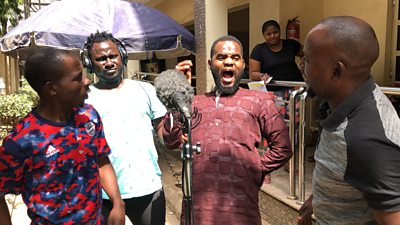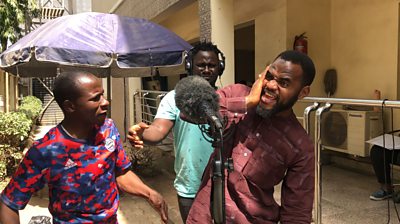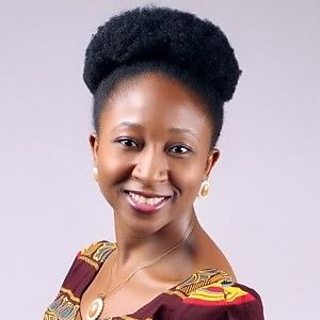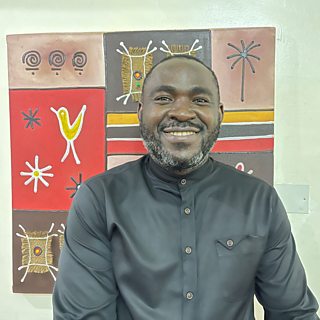As our Nigeria team prepares for the recording of the next season of Madubi (Mirror), our popular Hausa-language radio drama, learn how our research is building on our previous work to tackle stigma and discrimination against people with disabilities.
Our work on disability inclusion in Nigeria, funded by the , has covered multiple themes: from economic inclusion and employment for men and women with disabilities, to addressing stigma and discrimination surrounding disability. Now, we are tackling a new issue: supporting more inclusive health care, by understanding what it is like for people living with disabilities to visit health services and access family planning.
Across our work, we build on our learning and experiences so that we are not reinventing the wheel or even making the same mistakes, but expanding and strengthening. Working on disability-related projects in the last few years, including through the research and production of our popular season of the Story Story radio drama, has been interesting and a great learning opportunity for all of our team on inclusivity.
Earlier, we shared reflections on our efforts to be inclusive, especially in our research approaches. We continue to build on and adapt our work to make it inclusive. Now that we have begun our Inclusive Family Planning project, delivered with lead consortium partner, under the banner, our research is continuing to inform our inclusion-focused media content development strategies. A qualitative formative study for this project helped us to understand the barriers to, and enablers of, access to family planning services and modern contraceptives for people with disabilities in northern Nigeria.
The formative research identified profiles of people with disabilities and their influencers, including those who are likely to access and use family planning services and modern contraceptives, and those who are not. We summarised the findings in profiles which we presented to the creative team, to allow them to fully understand and engage with our insights.
How research profiles informed our characters
The target audience was segmented according to where they stand on thematic issues. Some of our profiles included:
- Faiza, a young mother with a hearing impairment, who wants to have more children and would like to space them. But she does not have the right information about family planning, and relies on the word of friends and family.
- Abu, a person with visual impairment who is averse to family planning; he believes children are from God and measures should not be put in place to delay getting pregnant.
- Shadiya, a person with a physical impairment, is unmarried and indifferent about family planning and modern contraceptives. She believes family planning and modern contraceptives are for married people, and thinks that when she gets married, she will get all the information she needs from her mother and married siblings.
- Jamila, a young girl with a learning disability who is not aware of her reproductive health and needs; her parents make the decisions for her.
- Nazif, a rural local government worker whose wife has a physical impairment. His biggest influencer is his mother, and he doesn’t believe in family planning, although it is accepted in his community. Nazif thinks: “Yes, it has been accepted in my community but personally, I am not convinced of it. I don’t know what is making people use it, I don’t see the reason why.”
- Rasheedat, an experienced health worker who advocates for family planning for couples but does not support family planning for the unmarried, due to her religious beliefs. She believes people with disabilities should access family planning, but has little knowledge about how to accommodate them.
We also included family members and caregivers of persons with disabilities – because we know they influence decision-making, and their knowledge and acceptance of family planning and modern contraceptives also varies.
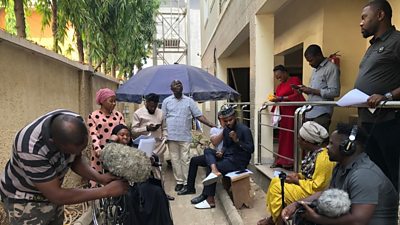
"The parents are the ones to take a decision… apart from parents, you might say the community head, or local government chairman or governor, but from the grassroots it’s their parents, they are the ones that can take decisions," a religious leader in Kaduna city told us.
Building profiles to create characters
We built and enriched these profiles with details that brought them to life, and made them relatable. The profiles helped our creative team learn audience perspectives and inspired the creation of characters in the drama.
For example, our characters Abu Maigoro, Amrah and Asabe were inspired by the research profiles. Abu is 40 years old and visually impaired; he has two wives and seven children, with another baby on the way. He makes a living by selling kola nut, among other things, and is a traditionalist. Amrah is 19 years old, a housewife and mother of one who has impaired hearing; she communicates with sign language. And Asabe is a 24-year-old woman who uses a wheelchair because of a physical disability.
Next, the research team tested these characters with audiences to see if the characters and their proposed journeys in the drama were realistic. Pre-test results showed that audiences found the characters interesting, relatable and authentic, and reflected people, events or situations around them in real life.
Here is what they heard in response:
“It could happen, because I know a visually impaired person who has four wives and takes care of them within his power to do so. You know it is not possible to handle every single problem. He does do as much as he can, though." - Man aged 26 – 35 living in urban Kaduna.
“Like you narrated that she didn't like being abused and stigmatised, she isn't alone in this, especially us with disabilities, we hate the way some normal people treat us. She reminds me of some people in respect of how her husband didn't allow her to further her education, there are other women like her where their husbands do the same to them. This affects us women.” - Female with a physical impairment aged 36 – 49, living in urban Kaduna.
We continue to learn about our audiences and aim to be even more inclusive in our work, never forgetting that audiences are at the heart of what we do.
The power of this exercise was also in recognising the importance of communicating research in usable and non-technical formats and methods. Sometimes, you need multiple formats to meet the needs of different users . We are thrilled that our results so far are having a powerful impact for our audiences and we look forward to the drama’s further development here in Nigeria.
